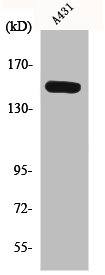Phospho-PLCB3 (S1105) Antibody
-
货号:CSB-PA000692
-
规格:¥880
-
图片:
-
其他:
产品详情
-
Uniprot No.:Q01970
-
基因名:
-
别名:1 phosphatidylinositol 4 5 bisphosphate phosphodiesterase beta 3 antibody; 1-phosphatidylinositol-4 antibody; 5-bisphosphate phosphodiesterase beta-3 antibody; Phosphoinositide phospholipase C antibody; Phosphoinositide phospholipase C-beta-3 antibody; Phospholipase C beta 3 antibody; Phospholipase C beta 3 (phosphatidylinositol specific) antibody; Phospholipase C-beta-3 antibody; PLC beta 3 antibody; PLC-beta-3 antibody; Plcb3 antibody; PLCB3_HUMAN antibody
-
宿主:Rabbit
-
反应种属:Human,Mouse,Rat
-
免疫原:Synthesized peptide derived from Human PLC β3 around the phosphorylation site of S1105.
-
免疫原种属:Homo sapiens (Human)
-
标记方式:Non-conjugated
-
抗体亚型:IgG
-
纯化方式:The antibody was affinity-purified from rabbit antiserum by affinity-chromatography using epitope-specific immunogen.
-
浓度:It differs from different batches. Please contact us to confirm it.
-
保存缓冲液:Liquid in PBS containing 50% glycerol, 0.5% BSA and 0.02% sodium azide.
-
产品提供形式:Liquid
-
应用范围:WB, IHC, ELISA
-
推荐稀释比:
Application Recommended Dilution WB 1:500-1:2000 IHC 1:100-1:300 ELISA 1:10000 -
Protocols:
-
储存条件:Upon receipt, store at -20°C or -80°C. Avoid repeated freeze.
-
货期:Basically, we can dispatch the products out in 1-3 working days after receiving your orders. Delivery time maybe differs from different purchasing way or location, please kindly consult your local distributors for specific delivery time.
相关产品
靶点详情
-
功能:The production of the second messenger molecules diacylglycerol (DAG) and inositol 1,4,5-trisphosphate (IP3) is mediated by activated phosphatidylinositol-specific phospholipase C enzymes.
-
基因功能参考文献:
- Data suggest that 300-residue C-terminal domain of PLCB3 promotes adsorption to phospholipid monolayer/membrane bilayer and is required for spatial organization/adsorption of PLCB3 on membrane surface; defects in phosphatidylinositol 4,5-bisphosphate (PIP2) hydrolysis alter monolayer adsorption, thus, suggesting role of active site in this process; PLCB3 is preferentially adsorbed to region of bilayer enriched with PIP2. PMID: 28945350
- These results indicate that the mechanism by which Galphaq and PLC-beta3 mutually regulate each other is far more complex than a simple, two-state allosteric model and instead is probably kinetically determined. PMID: 28842497
- We propose that unliganded PLC-beta exists in equilibrium between a closed conformation observed in crystal structures and an open conformation where the PH domain moves away from the EF hands. Therefore, intrinsic movement of the PH domain in PLC-beta modulates Gbetagamma access to its binding site. PMID: 27002154
- the MCP1-induced cortactin phosphorylation is dependent on PLCb3-mediated PKC activation, and siRNA-mediated down-regulation of either of these molecules prevents cortactin interaction with WAVE2 PMID: 26490115
- membranes are integral for the activation of PLC-beta isozymes by diverse modulators. PMID: 25193662
- the M3 muscarinic receptor maximizes the efficiency of PLCbeta3 signaling beyond its canonical role as a guanine nucleotide exchange factor for Galpha. PMID: 24596086
- This study provides an understanding of the structural basis for the PDZ-mediated NHERF1-PLCbeta3 interaction that could prove valuable in selective drug design against CXCR2-related cancers. PMID: 24642259
- PLCbeta3 is enriched in the cytosol. PMID: 23006664
- phospholipase C-beta3 structure reveals the role of the its distal C-terminal domain PMID: 23377541
- Stromal cell-derived factor-1 signaling via the CXCR4-TCR heterodimer uses PLC-beta3 to activate the Ras-ERK pathway and increase intracellular calcium ion concentrations PMID: 21705626
- Data demonstrate that PLCB3, by regulating intracellular calcium transients, plays a relevant role in amplifying the expression and release of IL-8, the major chemokine recruiting neutrophils in CF airway lungs. PMID: 21411730
- Activation of hPLCbeta3 by U73122 required covalent modification of cysteines as evidenced by the observation that enzyme activation was attenuated by thiol-containing nucleophiles, l-cysteine and glutathione. PMID: 21266572
- Studies indicate that the complex between the effector protein phospholipase C-beta3 (PLC-beta3) and its activator, Galpha(q), suggests that several effectors independently evolved a structurally similar helix-turn-helix segment for G protein recognition. PMID: 21304157
- study describe the structure of PLC-beta3 in an activated complex with Galphaq, which together with supporting biochemical and physiological analyses reveals its mechanism of transmembrane signaling PMID: 20966218
- PLC beta 3 and PLC beta 1 bind to calmodulin PMID: 12821674
- findings demonstrated that G-protein-activated phospholipase C-beta interacts with cell polarity proteins Par3 and Par6 to form protein complexes and to mediate downstream signal transduction PMID: 15782111
- reduced Ca(2+) signaling in high glucose cannot be explained by reduced Ca(2+) stores but is due to conventional PKC-dependent phosphorylation and inactivation of PLC-beta(3) PMID: 15998840
- Homodimerization of PLC-beta3 and PLC-beta1 isoenzymes was observed but heterodimerization of these isoenzymes was not detected. PMID: 16763092
- Fission of transport carriers at the trans-Golgi network is dependent on specifically PLCbeta3, which is necessary to activate PKCeta and PKD in that Golgi compartment, via diacylglycerol production. PMID: 17492941
- both negative crosstalk from the cAMP/PRKA pathway and a negative feedback loop in the oxytocin/G protein/PLCB pathway involving PRKC operate in myometrial cells PMID: 18322273
- PLCbeta3 may provide a selective target for inhibiting Ca(2+) responses to mediators of inflammation, including C5a, UDP, PAF, and LPA PMID: 18411281
- VEGF, specifically through VEGFR2, induces phosphorylation of two serine residues on PLCbeta3. PMID: 19295129
显示更多
收起更多
-
亚细胞定位:Cytoplasm. Membrane. Nucleus.
-
数据库链接:
HGNC: 9056
OMIM: 600230
KEGG: hsa:5331
STRING: 9606.ENSP00000279230
UniGene: Hs.523761
Most popular with customers
-
-
YWHAB Recombinant Monoclonal Antibody
Applications: ELISA, WB, IF, FC
Species Reactivity: Human, Mouse, Rat
-
Phospho-YAP1 (S127) Recombinant Monoclonal Antibody
Applications: ELISA, WB, IHC
Species Reactivity: Human
-
-
-
-
-





















